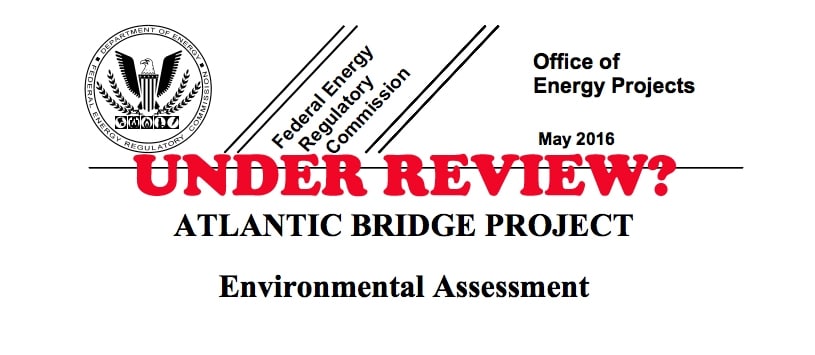Documents filed at the Federal Energy Regulatory Commission (FERC) show that a contractor hired by the government to provide an independent environmental assessment for Spectra Energy’s Atlantic Bridge project did not disclose its work for Spectra on a related gas pipeline.
Natural Resource Group LLC (NRG) was hired by FERC as a third-party contractor in February 2015 to review Spectra’s Atlantic Bridge — a proposed expansion of its existing Algonquin Gas Pipeline that runs through the Northeast US.
Yet as DeSmog first reported, at the time NRG was already working directly for the proposed PennEast Pipeline LLC, a consortium of companies including Spectra, that plans to bring fracked gas from Pennsylvania to Northeast markets.
Now, according to conflict of interest disclosure documents obtained by DeSmog from FERC through a Freedom of Information Act request, it has emerged that while NRG acknowledged it was working at the time directly for Spectra on other projects, it did not include its work on PennEast. Spectra joined the PennEast consortium in October 2014 because the proposed pipeline will interconnect to its Algonquin Gas Pipeline, boosting its delivery capacities.
NRG thus seems to have had a financial stake in Atlantic Bridge — the project it was being asked by FERC to independently assess.
DeSmog’s reporting into FERC’s hiring of NRG and the potential for financial conflicts has sparked repeated calls for a re-examination of the project from Massachusetts Democratic Senators Elizabeth Warren and Ed Markey.
What Disclosure Documents Did Not Disclose
While third-party contractors are paid by the pipeline company seeking FERC approval, they are considered independent consultants working under the control and supervision of FERC’s staff.
To avoid conflicts of interest, FERC publishes a handbook detailing the procedures by which such contractors are to be chosen. According to these rules, potential contractors must disclose to FERC any “direct or indirect relationship with any business entity which could be affected in any way by the proposed work.”
In NRG’s disclosure forms for Atlantic Bridge, the company acknowledged it was already working for Spectra on “various services in support of small expansion projects and pipeline operations and maintenance programs.”
Yet crucially, since NRG provides PennEast with public affairs services, these disclosures do not cover that work.
Image: From NRG‘s disclosure documents submitted to FERC in the Atlantic Bridge project.
As part of FERC’s disclosure questionnaire to potential contractors, in response to the question “To avoid what you perceive as a possible OCI [Organizational Conflict of Interest], do you (or your organization) propose to: exclude portions of the proposed work; employ special clauses; or take other measures?,” NRG answered “No.”
Image: From NRG‘s disclosure documents submitted to FERC in the Atlantic Bridge project.
In signing FERC’s conflict of interest disclosure forms, contractors vouch to “fully disclose” all information.
DeSmog also requested FERC produce other documents relating to the hiring of NRG, including Spectra’s initial request for proposals and FERC’s final review and approval of the hiring, but those have been withheld citing “market sensitive commercial data.”
According to FERC, release of those documents “could cause substantial competitive harm to Algonquin [i.e. Spectra Energy] and ERM [NRG’s parent company].”
One of the three documents supplied to DeSmog was redacted on the same grounds.
Both Spectra Energy and NRG have repeatedly ignored DeSmog’s requests for comment on this ongoing story.
However, in response to concerns raised by residents affected by Atlantic Bridge, Spectra recently stated that the ultimate decision to hire a third party contractor rests in the hands of FERC.
Spectra also minimized its involvement in PennEast Pipeline, saying that as a minority partner it is not responsible for the consortium’s public affairs services provided by NRG.
In NRG’s final environmental assessment for Atlantic Bridge, published in May this year, the company found the proposed project did not “constitute a major federal action significantly affecting the quality of the human environment.”
Senators Warren and Markey Keep Heat on FERC
In response to a letter by Massachusetts Senators Elizabeth Warren and Ed Markey following DeSmog’s original reporting on the alleged conflict of interest, FERC’s Head Commissioner Norman Bay said his staff followed the procedures for choosing third party contractors and “no disqualifying conflict of interest was identified.”
Yet as the disclosure documents obtained by DeSmog suggest, since FERC was not told about NRG’s full range of work for Spectra at the time, it may have arrived at that conclusion based on incomplete information.
Senators Warren and Markey recently followed up with demands for more specific answers on how the contractor was chosen.
Subscribe to our newsletter
Stay up to date with DeSmog news and alerts









